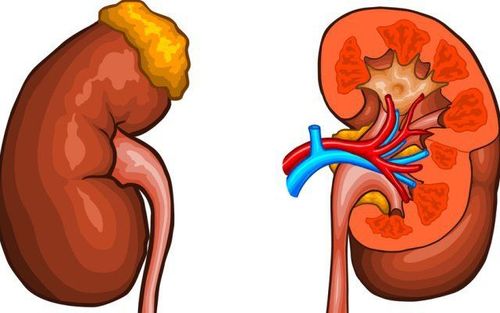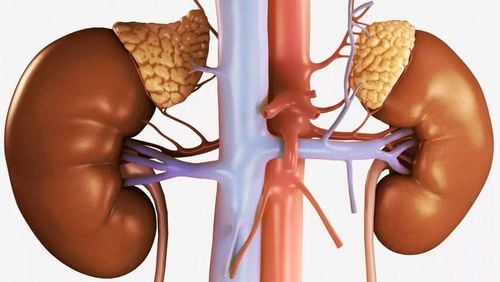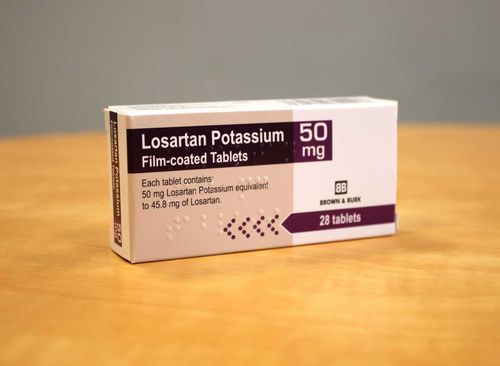This is an automatically translated article.
The article was consulted with Dr. To Kim Sang - Oncology Center, Vinmec Central Park International General Hospital.Adrenal cancer is a rare type of cancer that occurs in one or both of the adrenal glands. When adrenal cancer is detected early, the disease has a good chance of being cured.
1. What is adrenal cancer?
Adrenal cancer is a rare type of cancer that forms in one or both of the small, triangular glands (adrenal glands) located on top of the kidneys. The adrenal glands produce hormones that help regulate almost every organ and tissue in the body. Adrenal cancer, which can occur at any age, is more common in children under 5 years of age and in adults between 40 and 50 years of age.When adrenal cancer is detected early, the disease has a good chance of being cured. But if the cancer has spread to areas outside the adrenal gland, treatment is more difficult, mainly with treatment aimed at delaying the progression of the disease.
Most growths of tumors in the adrenal glands are benign, such as adenoma or pheochromocytoma.
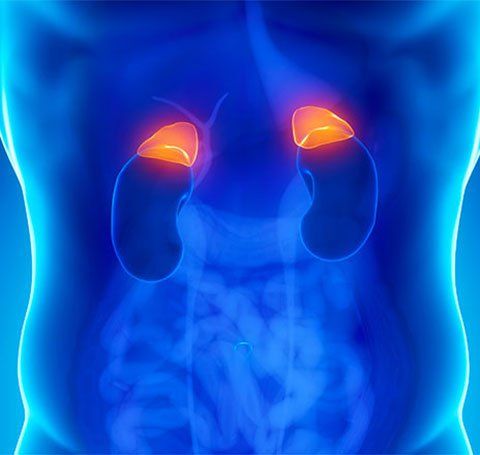
Hầu hết ung thư tuyến thượng thận đều là lành tính nhưng cần được điều trị càng sớm càng tốt
2. Symptoms of Adrenal Cancer
Signs and symptoms of adrenal cancer include:Muscle weakness Pink or purple stretch marks on the skin Hormonal changes in women can cause excess hair, hair loss on the head Hormonal changes In men can cause enlarged breast tissue and testicular atrophy Nausea Vomiting Abdominal bloating Back pain Fever Loss of appetite Weight loss
2.1 Symptoms caused by overproduction of androgens or estrogens
Symptoms caused by overproduction of androgens or estrogens. Women with estrogen overproduction tumors and men with androgen overproduction tumors often don't have any symptoms from the hormone, so symptoms may not appear until the tumor is full. great.Some recognizable androgen or estrogen related adrenal cancer signs include enlarged breasts, erectile dysfunction and loss of sex drive in men and excessive facial hair growth, menstrual cycle irregular, deeper voice in females.
2.2 Symptoms of Overproduction of Cortisol
Excessive cortisol levels cause Cushing's syndrome. Signs and symptoms may include:Weight gain, mainly on the collarbone, in the cheek area and around the abdomen Purple stretch marks on the abdomen Excessive hair growth on the face, chest and back in women Menstrual disorders Menstruation Weakness and loss of muscle mass in the legs Easy bruising Depression and/or moodiness Weak bones (osteoporosis), which can lead to fractures High blood sugar, which often leads to diabetes High blood pressure Association Cushing's syndrome can be caused by an adrenal cancer or an adrenal tumor caused by high levels of cortisol and/or hormones, but it can also have other causes.
2.3 Symptoms of overproduction of aldosterone
The main signs and symptoms caused by aldosterone-producing adrenal tumors are:High blood pressure Weakness Muscle cramps Low blood potassium levels.
2.4 Symptoms caused when the tumor spreads to other organs
As adrenal cancer grows, it puts pressure on nearby organs and tissues, causing pain near the tumor and a feeling of fullness in the abdomen.3. Diagnosis of Adrenal Cancer
Laboratory and laboratory tests used to diagnose adrenal cancer include:3.1 Blood and urine tests
Blood and urine tests can show abnormal levels of hormones produced by the adrenal glands, including cortisol, aldosterone, and androgens.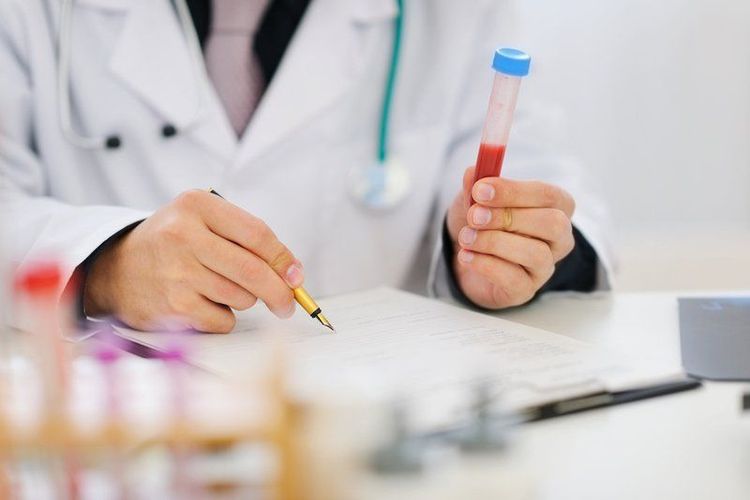
Xét nghiệm máu có thể chẩn đoán bệnh ung thư thượng thận
3.2 Imaging tests
Your doctor may recommend a CT scan, MRI, or PET/CT scan to check for growths on the adrenal glands and to see if the cancer has spread to other areas of the body, like the lungs or liver. .3.3 Adrenal biopsy
If your doctor suspects you have adrenal cancer, your doctor may recommend removal of the affected adrenal gland. After the tumor is removed, the surgeon will transfer the tumor tissue to the Pathology department, the pathologists will process the tissue sample and evaluate whether the tumor is cancerous or not. This analysis helps confirm whether you have cancer and exactly what cell types are involved.4. Adrenal Cancer Treatment
4.1 Surgery
Surgery aims to remove the entire adrenal cancer. To achieve this, doctors must remove all of the affected adrenal glands (adrenectomy).If during surgery, the doctor finds that the tumor has spread to nearby organs, those organs are also removed during surgery to reduce the risk of recurrence.
4.2 Radiation therapy
Radiation therapy uses high-energy beams, such as X-rays and protons, to kill cancer cells. Radiation therapy is sometimes used after surgery for adrenal cancer to destroy any remaining cells. It can also help relieve pain and symptoms of cancer that has spread to other parts of the body such as bones.4.3 Chemotherapy
Chemotherapy is the use of chemicals to kill cancer cells. Chemotherapy can play a role in adjuvant therapy after surgery to reduce the risk of recurrence or as the main systemic treatment in advanced, metastatic adrenal cancer. For adrenal cancer that doesn't go away with surgery or comes back after initial treatments, chemotherapy may be an option to slow the cancer's progression.Mitotane (Lysodren) may be recommended after surgery for people at high risk of cancer recurrence. Studies on the effects of this drug are underway. Some other chemotherapy drugs can be effective in some cases of adrenal cancer treatment such as cisplatin, etoposide, doxorubicin,...
Currently, Vinmec International General Hospital is applying packages Cancer screening aims to detect the disease at an early stage, shorten the treatment time, reduce the economic burden and maximize the possibility of recovery for customers.
Please dial HOTLINE for more information or register for an appointment HERE. Download MyVinmec app to make appointments faster and to manage your bookings easily.





